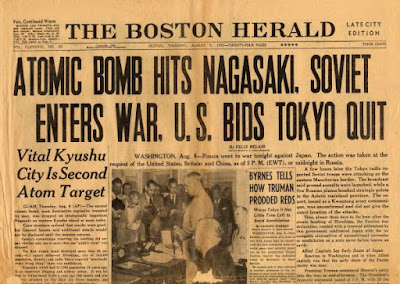438th AAA AW BN
APO 513 % Postmaster, N.Y.
14 August, 1945 0930
Nancy
Dearest darling Wilma –
Having been away most of yesterday, I didn’t get a chance to look at my mailbox until this a.m. and what do you think – letters from you of the 4th, 5th, 6th of August – and if you don’t think those 3 letters put me right up there with all the fleecy clouds, well, darling, you’ve got something wrong with you. Yup – I feel swell; and why not? You love me, I love you and can you tell me a better combination?
As I wrote you yesterday, dear, I went down to St. Die. Today I’ve got to go to Toul. You see, darling, we have small M.P. detachments in various outlying towns and I’ve got to visit them from time to time. In the evening – we just stayed around. Most of the boys were still tired from Saturday night.
I was interested in your reaction to your visit to Norwood at the Kleins. I think a lot about where we’ll live – I mean what kind of set-up we’ll have – and I must admit, it isn’t quite fully crystallized as yet in my mind. My set-up was simple when I was in Salem, because I was single. The place where my office was – was a good spot and chances are I can have it back if I want it. It’s on a good street and near most of the doctors. Also – my former patients know where it is. One other very important feature is the telephone service. With Mrs. Tucker and Maude presumably still running the Nurse’s Agency – her phone is always covered and so would mine be. You realize of course, dear, how convenient that would be. That would mean then – that we would have to find a place for ourselves. The other alternative would be to find a place from the start that would take care of everything. It sounds difficult now – but in fact, sweetheart, it’s so nice to think about. The conversation around here recently has been about how much time the various fellows were going to take off – after discharge – before getting started again as a civilian. Hell – the way I feel now – I don’t want any time off at all. I’m just rarin’ to get started and build that practice up again. Hell – I’m going to have responsibilities, aren’t I?
Boy – I really feel on the ball this morning! I wonder why; could be I’m in love with you and those 3 letters, too; could be I’m very happy you love me, too; could be my thoughts of the future with you are very nice, bright and rosy. Yes – I‘m sure it’s all of that, darling – and let’s hope soon!
So long for another little while, dear, and my love to the folks – and – remember –
Having been away most of yesterday, I didn’t get a chance to look at my mailbox until this a.m. and what do you think – letters from you of the 4th, 5th, 6th of August – and if you don’t think those 3 letters put me right up there with all the fleecy clouds, well, darling, you’ve got something wrong with you. Yup – I feel swell; and why not? You love me, I love you and can you tell me a better combination?
As I wrote you yesterday, dear, I went down to St. Die. Today I’ve got to go to Toul. You see, darling, we have small M.P. detachments in various outlying towns and I’ve got to visit them from time to time. In the evening – we just stayed around. Most of the boys were still tired from Saturday night.
I was interested in your reaction to your visit to Norwood at the Kleins. I think a lot about where we’ll live – I mean what kind of set-up we’ll have – and I must admit, it isn’t quite fully crystallized as yet in my mind. My set-up was simple when I was in Salem, because I was single. The place where my office was – was a good spot and chances are I can have it back if I want it. It’s on a good street and near most of the doctors. Also – my former patients know where it is. One other very important feature is the telephone service. With Mrs. Tucker and Maude presumably still running the Nurse’s Agency – her phone is always covered and so would mine be. You realize of course, dear, how convenient that would be. That would mean then – that we would have to find a place for ourselves. The other alternative would be to find a place from the start that would take care of everything. It sounds difficult now – but in fact, sweetheart, it’s so nice to think about. The conversation around here recently has been about how much time the various fellows were going to take off – after discharge – before getting started again as a civilian. Hell – the way I feel now – I don’t want any time off at all. I’m just rarin’ to get started and build that practice up again. Hell – I’m going to have responsibilities, aren’t I?
Boy – I really feel on the ball this morning! I wonder why; could be I’m in love with you and those 3 letters, too; could be I’m very happy you love me, too; could be my thoughts of the future with you are very nice, bright and rosy. Yes – I‘m sure it’s all of that, darling – and let’s hope soon!
So long for another little while, dear, and my love to the folks – and – remember –
I’m yours alone for always
Greg
Toul is located between 12 miles (19 km) west of Nancy, and is situated between the Moselle River and the Canal de la Marne au Rhin. Consequently, it was once an important port. The barges known as péniches still navigate these watercourses commercially, typically carrying steel, though in the summer much more of the water traffic is for pleasure.
Toul was known to the Romans as Tullum Leucorum. By the Treaty of Meerssen of 870, Toul became part of East Francia, the later Holy Roman Empire. During the High Middle Ages, it became a Free Imperial City. Toul was annexed to France by King Henry II in 1552; this was recognized by the Holy Roman Empire in the Peace of Westphalia of 1648.
The most striking features of Toul are its impressive stone ramparts. There appears to have been a fortified town at this location since the earliest recorded history. Those that exist today are the work of Sébastien Le Prestre de Vauban, Louis XIV's military engineer. In 1698 he designed a new enclosure and work began in 1699-1700. The fortifications were strengthened again after the Franco-German War of 1870. During the siege of 1870 during the Franco-Prussian War, the last time that Toul's defenses were used as a classic fortress, 64 guns opened fire at 6:00 a.m. on 23 September, and the fortress surrendered at 3:00 p.m. after 2,433 shells had been fired.
Today, the ramparts encircle and define the old town. They are built of dressed white stone, and topped with grass, and in places are over five meters high.
The city was also the primary base of the United States Air Service - predecessor to the United States Air Force - during World War I. As such, it was a base for many of the 45 war time squadrons. The former fortress town was rebuilt after World War II, during which whole sections were devastated by fire.
The old town's architecture is dominated by past glories in various states of decay, including a major Gothic cathedral, which is in a poor condition and is being slowly restored. Many of the houses were built as canonical residences in the Late Middle Ages and bear vestiges in the form of ornamental stonework. Notable churches that have survived including the restored cathedral of Saint-Étienne, dating from the 13th century, and the 13th–14th-century church of Saint-Genoult.
Toul was known to the Romans as Tullum Leucorum. By the Treaty of Meerssen of 870, Toul became part of East Francia, the later Holy Roman Empire. During the High Middle Ages, it became a Free Imperial City. Toul was annexed to France by King Henry II in 1552; this was recognized by the Holy Roman Empire in the Peace of Westphalia of 1648.
The most striking features of Toul are its impressive stone ramparts. There appears to have been a fortified town at this location since the earliest recorded history. Those that exist today are the work of Sébastien Le Prestre de Vauban, Louis XIV's military engineer. In 1698 he designed a new enclosure and work began in 1699-1700. The fortifications were strengthened again after the Franco-German War of 1870. During the siege of 1870 during the Franco-Prussian War, the last time that Toul's defenses were used as a classic fortress, 64 guns opened fire at 6:00 a.m. on 23 September, and the fortress surrendered at 3:00 p.m. after 2,433 shells had been fired.
Today, the ramparts encircle and define the old town. They are built of dressed white stone, and topped with grass, and in places are over five meters high.
The city was also the primary base of the United States Air Service - predecessor to the United States Air Force - during World War I. As such, it was a base for many of the 45 war time squadrons. The former fortress town was rebuilt after World War II, during which whole sections were devastated by fire.
The old town's architecture is dominated by past glories in various states of decay, including a major Gothic cathedral, which is in a poor condition and is being slowly restored. Many of the houses were built as canonical residences in the Late Middle Ages and bear vestiges in the form of ornamental stonework. Notable churches that have survived including the restored cathedral of Saint-Étienne, dating from the 13th century, and the 13th–14th-century church of Saint-Genoult.





















